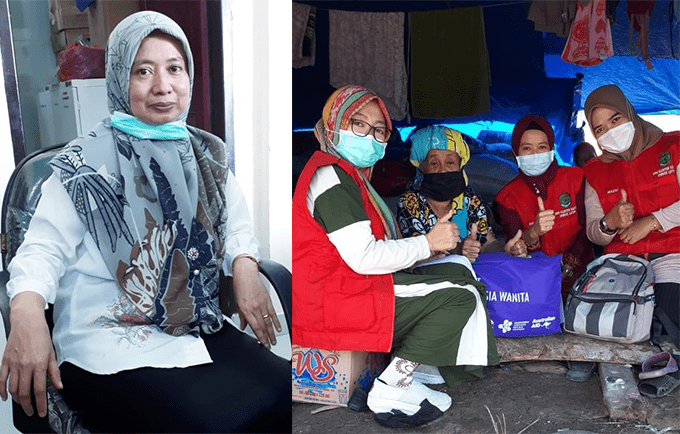“Umm, I don’t know… We have been provided with vitamins. As for the rest, we get it all under control so far…” Syahruni has a hard time naming the support she needs to do her job as the Coordinator of the District Reproductive Health (RH) sub-cluster in the emergency response of the recent flooding and landslides in North Luwu, South Sulawesi, Indonesia. When asked to identify the needs of women currently sheltering in internally displaced people (IDP) camps, however, she can go on and on.
“What we need the most are individual kits for pregnant mothers, especially since most of them have lost their clothes. We also still need more reproductive health supplies… for post-delivery, newborn babies, toddlers, and many more,” Syahruni explains. “Out of the 303 pregnant women staying in the tents right now, we have only provided intervention for 70 due to limited supplies… We still have a long way to go, but we’re almost out of the logistics…So, we have been prioritizing those who are approaching their due dates and from low income families,” she adds.
This is Syahruni’s first experience working in disaster response. The 46-year-old woman has worked at the District Health Office of North Luwu in her native province of South Sulawesi for about 18 years now. Starting her career in the Planning division, she is currently the Coordinator of the Public Health Division. Having served in this position since 2019, she is entrusted with the task of coordinating the District RH sub-cluster after floods and landslides struck six districts in the North Luwu regency on 13 July evening. At least 38 people were killed, 10 disappeared, and around 15,000 (4,897 households) are sheltering in IDP camps in 11 spots as of 19 August 2020 (BNPB).
“The sub-cluster was formed on 16 July even though initial services have been provided the day after (the disaster) because many District Health Office staff were impacted… Our first response was distributing supplements such as iron, folic acid, and multivitamins for pregnant women,” Syahruni says. “We provide antenatal care (ANC) services for pregnant mothers, post-delivery care, and newborn baby care. We prepare the reproductive health logistics so that the aid reaches the target (beneficiaries),” she adds.
To perform her job, Syahruni has to meet and coordinate with the rest of the Health cluster members every morning. “We meet in person, not online… we maintain physical distance of course,” she says with a laugh. She does not sound panicked when she tells us about a teammate in the RH sub-cluster who was recently tested positive for COVID-19. “The whole team took the swab test and thank God most of us tested negative… Our colleague who tested positive is still in isolation… We worked closely together on the ground, so thank God I didn’t get infected,” she says, calmly.
It is her can do attitude, combined with her dedication to public service, that has helped her get through the challenges she has faced at work. “One thing that the head of our office has reminded us since the beginning was that we’re lucky that we’re in a position to provide help, instead of receiving it. Working in the public health sector, we are always at the front line in emergency response. We are always motivated to serve the people,” Syahruni says with conviction.
#RealLifeHeroes #WHD2020
Dian Agustino
Communications Officer, UNFPA Indonesia


